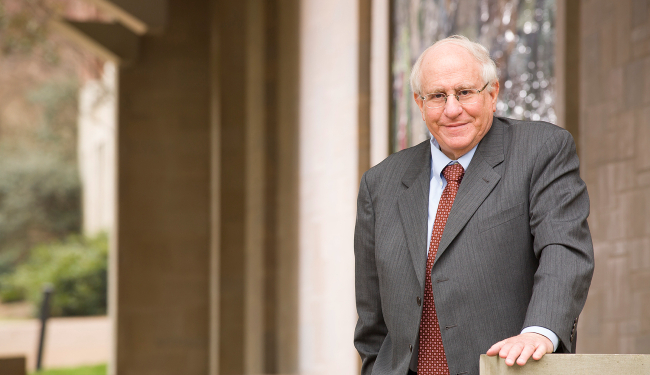In 1970, soon after moving to Nashville to join Vanderbilt Law School’s faculty, New York native Jim Blumstein attempted to register to vote in Tennessee. At the time, though, Tennessee law required newcomers such as himself to live in the state for one year before becoming eligible to cast a ballot, and counties in the state had their own three-month requirement.
Blumstein promptly filed suit against the state, claiming its durational residency laws violated the equal protection clause of the 14th Amendment—and won. After the state appealed, the Supreme Court eventually took up Dunn v. Blumstein in what was his first-ever case as a lawyer. On March 21, 1972, the high court issued a 6–1 decision in Blumstein’s favor, with Justice Thurgood Marshall writing in his majority opinion that durational residency laws “exclude too many people who should not, and need not, be excluded.”
Here Vanderbilt Magazine talks with Blumstein, University Professor of Constitutional Law and Health Law and Policy, about the 50th anniversary of the Supreme Court’s decision and how the experience continues to resonate for him as a professor.

What made you decide to file the lawsuit against the State of Tennessee?
I was frustrated that I wasn’t going to be able to vote. I’d always been a very conscientious voter, and I knew I couldn’t cast an absentee ballot in New York because I was no longer a resident there. Residency rules state that you must have the intent to come back, and I was planning to stay in Nashville. So, under Tennessee law, I was essentially a person without a home for a year in terms of being able to vote.
Did anything surprise you when you were arguing before the Supreme Court?
Justice Marshall, who was one of the justices I counted on my side—and who eventually wrote the opinion—asked me some very tough questions. Sometimes justices will ask tough questions because they want to cover their bases. But he was also making sure that I didn’t overstate my case. I don’t remember the exact exchange, but the implication was that I could win the case without carrying it too far. In that moment, I realized he was a friend and that he was basically trying to make my case stronger.
What impact did your victory have on voting in this country?

For one, it solidified that voting is a fundamental interest and is subject to what is called strict scrutiny—that is to say that the burden of justification is on the state. And then in terms of the travel aspect, census data showed that about 3.3 percent of citizens move from state to state each year, and another 3.3 percent or so move from county to county. So, somewhere between 6 percent and 6.5 percent … who would otherwise be disenfranchised every year were in fact enfranchised as a result of the case.
How did the experience of the case influence your teaching?
The thing I always tell my students is to think through your theory ahead of time and do the research before you file the case. That’s especially true for a case that doesn’t turn on the facts, but turns on the law and on the constitutional issues embodied in other Supreme Court cases. I also tell my students that it’s important to show respect to the arguments of the other side.
What are your thoughts on the current debates around voter registration and fraud?
Voter fraud has been an issue for hundreds of years. Even though it’s diminished now, that doesn’t mean that if you relax the restraints it won’t reappear. What you have to do is limit the effect on legitimate voting. For example, I don’t support getting rid of in-person voter registration, especially if you’re going to use absentee balloting. If you remove all the safeguards, then you breed suspicion—and unfortunately that’s what we have right now.
Jim Blumstein was interviewed by Melanie Moran, associate vice chancellor for university relations.
Read more about Blumstein’s case in Vanderbilt Lawyer, Politico and the Tennessee Bar Journal.
Watch an interview with Blumstein on the Tennessee Voices podcast.